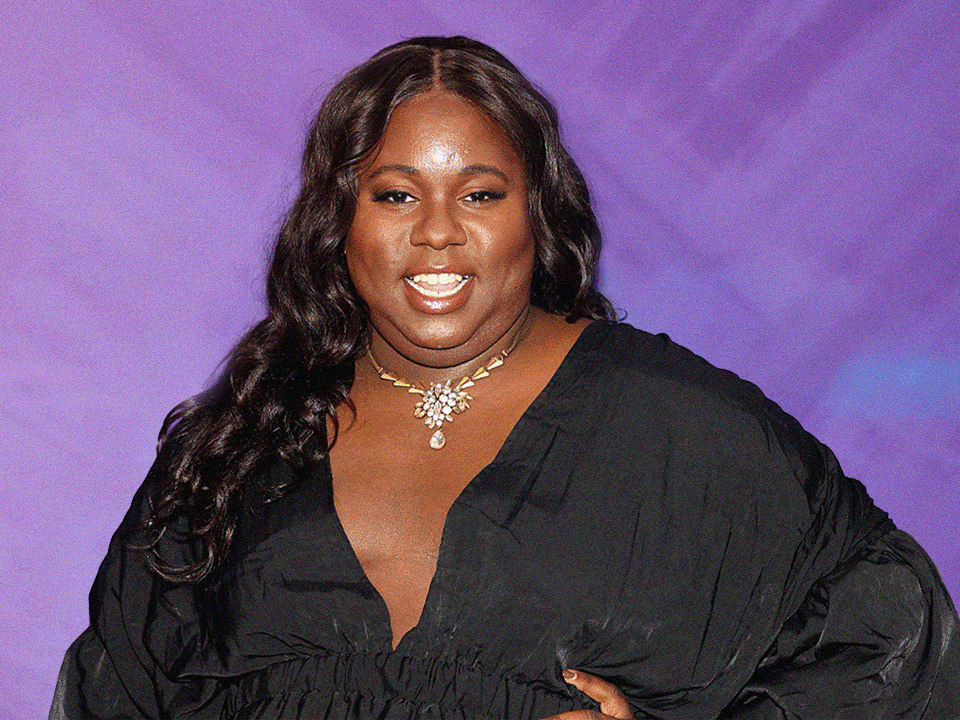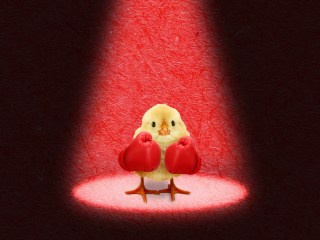Alex Newell Is Serious About Their Rest
“Unless it's me talking to Oprah or a seance with Barbara Walters, I'm not moving from my bed.”
Since entering the scene via Oxygen’s The Glee Project (a reality show audition for the delightfully unhinged Fox series), Alex Newell has gone on to dominate the television, music, and theater worlds. Most recently, they’ve been starring in Shucked on Broadway and even made history as the first open nonbinary actor to win a Tony in a performance category. It was the best featured actor category, JFYI.
Speaking about the win, Newell says the praise hasn’t fully sunk in just yet. “I don't think you really process it,” they tell Wondermind. “It’s not like winning a Grammy or winning an Oscar or anything [where] you're talking about your former work when you're winning these things. I'm still there eight shows a week.” That said, it’s certainly validating. “I mean, yeah, you get the audience's applause each and every night, but I think that is the big ol’ stamp of approval.”
As Newell continues their run in Shucked, belting out powerful hits like “Independently Owned,” they paused for a mental health check-in to share what’s on their mind. Here, the theater star talks about the importance of rest and asking for help.
[Sign up here to never miss these candid conversations delivered straight to your inbox.]
WM: When it comes to your personal mental health journey, is there a time period or moment that stands out to you the most?
Alex Newell: Well, when my father died, my mother was a huge proponent of putting me in therapy right after. And so from the time I was six, at a very young age, I had a lot of anger issues because I thought something was wrong with me. You look at all these families that have two parents. I think therapy really helped me validate my life in a way and [gave me] the tools that I needed to structure my life going forward.
WM: Did you go to therapy all throughout your adolescence or was it an on-off thing?
AN: It was more so a majority of my adolescence. I mean, it's hard. I was the only Black kid in school for a very long time. My family always says “the only fly in the buttermilk.” [It] really does something to you sometimes because you are always inherently different. I think that doesn't create a safe space all the time, especially at a young age.
WM: How do you think growing up in that kind of setting impacted your identity and self-image?
AN: I think it gave me the tenacity and the wherewithal to have the eyes and the gaze that anything is possible, especially in that time when race wasn't, not a taboo, but it wasn't in the forefront of the psyche of our society, really. … I think being in that situation, in that space, made it seem normal for me to know that I could have everything and everything was at my fingertips, and I could be anything. Yeah, I had to hide, and I had to code switch—even with my own family sometimes. [They’d be] like, “Oh, you think that you're better than me because you go to an all-white school?” And I'm just like, “No, that's just a school that my mom put me at.”
I think I became myself when I really looked at myself and finally found something that I wanted to do for the rest of my life.
WM: What's something that you're proud of in your mental health journey?
AN: [Realizing] that being myself is truly just enough. Everyone, especially when you're starting your career, tells you what you have to do, tells you who you ought to be, who the template is that's come before you and that you should follow after. It's very hard, and it's very disheartening sometimes because you're only seen through one lens, and all the work that you've done before then goes away because you're told that the only way you can be successful is if you do this archetype. I've been steadfast in trying to break that stereotype [by] being 100% unabashedly myself.
I teach at an organization that I'm on the board of called Broadway Dreams, and one of the kids asked me, “How am I going to be successful if everybody on Broadway has a belt and I have a legit soprano? And I said, “You'll always find work. You'll always have a place, and you have to stop looking at this metaphorical box that people try to put you in and say that that is truly non-existent. There is always going to be a place for you. You just have to realize that.” And I think that's what's gotten me thus far in my career. I love reflecting back on that, that being myself is 100% OK.
WM: When people try to put you in that box, do you push back in the moment?
AN: I just laugh most times. There's only so much you can do. You can just laugh. Sometimes I’m just petty, and I prove them wrong.
WM: You can't educate everybody every time. You're also a bit of a workaholic. How do you make sure you're taking time to recover and prevent burnout?
AN: I set hard boundary lines. Being burnt out when you're a workaholic is inevitable. It's going to happen. I'm just very blessed and fortunate that I have different avenues that I can focus on at each time. If I get sick of doing Broadway, if I'm burnt out with that, I could go back [to] film and TV, or I could go record music and do all of that.
But I do set very harsh boundary lines, and my rest is most important. Even with press, I can only do Tuesdays, Thursdays, and Fridays. That's it. Monday is my one day off in the week. Unless it's me talking to Oprah or a seance with Barbara Walters, I'm not moving from my bed. My rest is important. Eight shows a week is a lot. It's very hard on the body and the psyche to make yourself do things. And I for damn sure am not going to do anything on a two-show day.
WM: What’s one of the best pieces of mental health advice you've received?
AN: It goes back to asking for what you need. I'm an only child, and I was raised by a single parent. I'm singular. I don't like asking for help. I like telling people what I need. I don't like seeming helpless in a way. [But] just because you are strong and independent and can do it on your own does not mean that you can't go out and ask people for help and tell people what you need in that moment.
WM: What mindset shifts encourage you to reach out?
AN: Biting the bullet and swallowing my pride sometimes. Just doing it. Because you can do so much on your own for so long, but then you start resenting everything and everyone around you. I always say, “If you're going to sit here and do it on your own, don't complain.” When you're burnt out and you don't want to do it anymore and you're asking why nobody's helping you, [it’s] because you haven't asked for help. It's like my mom always said, “A squeaky wheel gets oil, and a closed mouth doesn't get fed.”
WM: And it’s hard to ask, especially when you think you could maybe do something better than somebody else.
AN: You can still micromanage them. You can still tell them, “Well, thank you for that avenue. I don't think that's going to work. But, anything else you got?”
WM: If you could give yourself a pep talk right now, what would you say?
AN: Go to bed. Get some sleep. Drink some water. That's the pep talk I need right now. … Mainly because I just celebrated my birthday and I didn't know what water was for two days.
But besides that, I am a huge proponent of rest even though I never take it. I'm nearing the place where I'm just like, if you don't go sit down and take some rest and take some time and just reflect on all that you've done this year alone—and this year isn't even done yet. … It’s OK to sit back and rest and reflect and be happy about it.
WM: What else would you like to add?
AN: Taking care of yourself is just so important. And feeling that you are alone in this is so detrimental to your mental health. If you ever feel that way, you have to reach out to anyone that will listen. If you think you're the only person going through it, you're not. People just aren't as vocal about it. I just want to reiterate that for a lot of people because a lot of the strongest people are the people that literally don't take care of themselves that much.
This interview has been edited and condensed for length and clarity.
Wondermind does not provide medical advice, diagnosis, or treatment. Any information published on this website or by this brand is not intended as a replacement for medical advice. Always consult a qualified health or mental health professional with any questions or concerns about your mental health.




